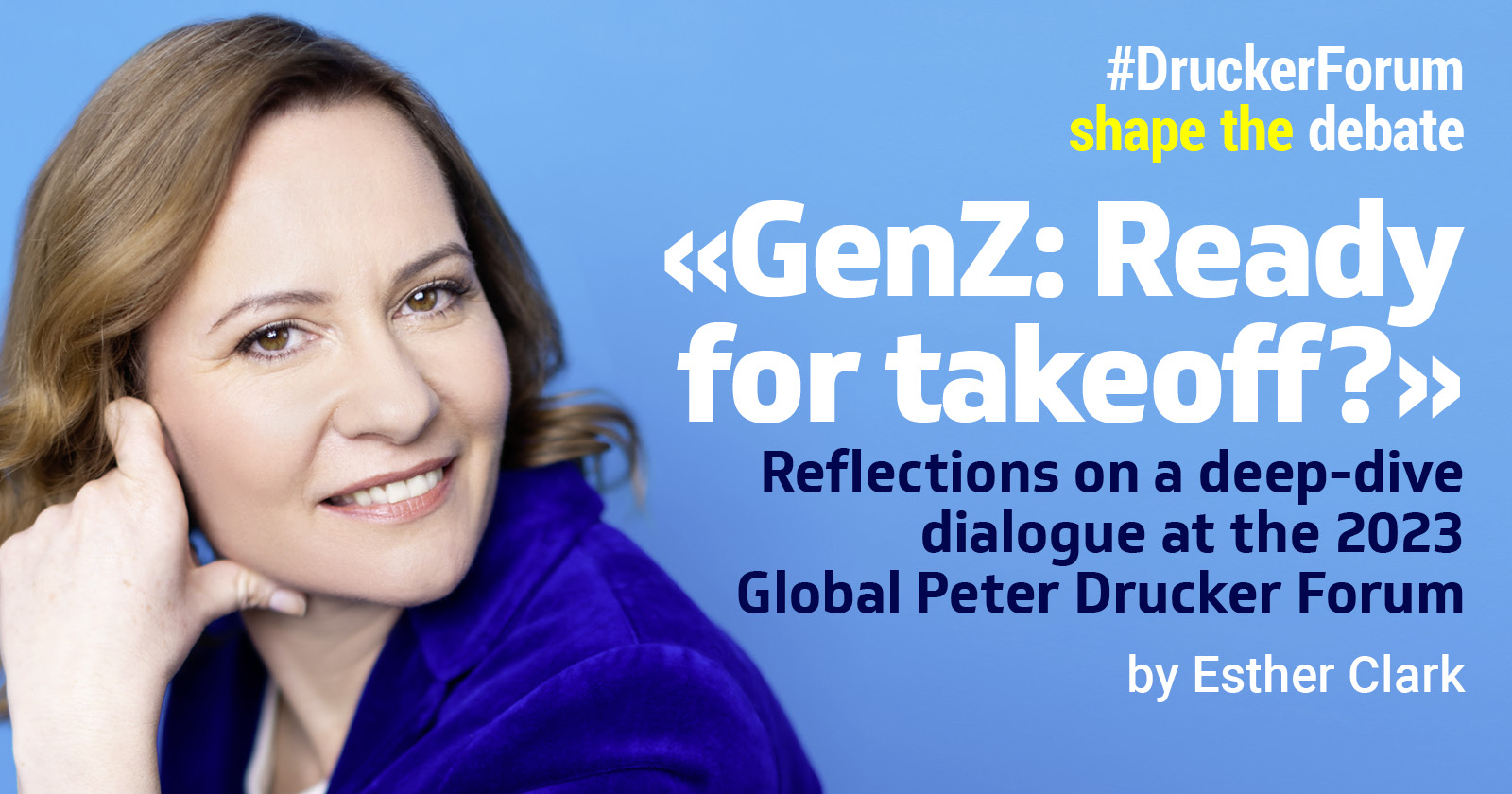
A research company out of London called The Nursery suggests that not all 18-year-olds think alike. While on the surface this doesn’t appear an earth-shattering finding, dig a little deeper and there are enormous implications for business and society.
“There is a huge inter-generational gender disparity around societal issues and gender roles in particular with the socially liberal views of this generation, driven by young women,” the report states. It goes on to say that “on some issues, 18-year-old men are less liberal in their views than Baby Boomer men.” Implication: to understand what young people want and need, we must reconsider our labels and check our assumptions around how young people see themselves.
In November I had the opportunity to do just that on the Drucker Forum panel “GenZ: Ready for takeoff?” The session was chaired by Rodrigo Catilhos of Skema Business School, in conversation with moderator and entrepreneur Sophie Kaitlin Drescher and economics student and Drucker Essay Challenge winner Abhishek Banerjee, with the aim of understanding GenZ views and sparking debate. As a generation coming of age alongside social media, climate anxiety, a pandemic, and advancing AI, GenZ may just find itself called on to be a super-resilient generation.
From the outset, two of the panellists, despite being GenZ and similar in age and education, expressed very different opinions. As a result, they agreed it would be more constructive to be seen as “one species” together with all generations, rather than a separate group of needs and wants.
Drescher noted that the session got her thinking about “what makes us tick” and highlighted the importance of spaces for dialogue and interaction; the Hofburg Vienna, she said, “turned into this cool space where we explored the ins and outs of being GenZ.” As I know from many years participating in the Drucker Forum, this year as a Drucker TV host and panel chair, providing an environment for discourse and discovery is something the conference does very successfully every year. Dialogues like this one highlight what we may be doing wrong as leaders of organisations and management thinkers and where we need to change; they reveal to us what we don’t know and challenge some of our strongly (or loosely) held beliefs. In sum, diverse perspectives can spark change and reflection.
Since the Forum I have had time to reflect on how transformation itself is a concept all generations struggle to conceptualise. University of Colorado physics professor Albert Allen Bartlett famously said, “The greatest shortcoming of the human race is our inability to understand the exponential function.” In the same vein, Farnam Street’s Shane Parrish recently wrote: “When we talk about Moore’s Law, we easily underestimate what happens when a value keeps doubling. Sure, it’s not that hard to imagine your laptop getting twice as fast in a year, for instance. Where it gets tricky is when we try to imagine what that means on a longer timescale. What does that mean for your laptop in 10 years? There is a reason your iPhone has more processing power than the first space shuttle.”
If change is not only a constant but an exponential factor, is GenZ resilient enough to face challenges that we have yet to imagine and identify? Are its members really “ready for takeoff”?
The “Creative Resilience” theme of 2023’s Forum was aptly chosen, suggesting a requirement for creative approaches to expanding problems. Generations ago, Peter Drucker described the implications of transformation and the need to build organisations that don’t need superheroes to run them – creative resilience, yes; superheroes and impossible leadership gurus, no. One GenZ panelist posed a related question: “Are we, the resilient Gen Z, super strong, or are there things we need but aren’t getting for success?” The conversation went on to express the demand for purpose, to be heard and included in decisions and for opportunities to share thoughts and ideas. Frustration – “a great motivator” – was also felt to have a role to play in fuelling change and better, more inclusive organisations.
In one interview for Drucker TV, I chatted with Christian Bason, former CEO of the Danish Design Center and author of “Expand: Stretching the Future by Demand”, about an interesting quote made by the US industrial designer Charles Eames in the 1970s. Asked to define the boundaries of design, he replied: “What are the boundaries of problems?” For Bason, some of the questions we should be asking ourselves are around the choices we make and the impact of our product, service, or business in the long term. He went on to ask: “Who do we design for? Do we design for all genders? Do we design for at risk communities? Do we design for life in all its forms?”
We might say that the desire for change is clear, and change is exponential. Problems are expanding, and so is the need for design and for diversity in insights and decision-making. GenZ in its own unique way is leading the way in this regard because by their very nature, they embody diversity at the same time as they call for a platform for their voices and response to their needs (and perhaps frustrations). Ready for takeoff? It depends on all of us.
About the author:
Esther Clark, a previous Drucker Essay Challenge Laureate, is an author and contributor to Forbes, America Economia, and the Christensen Institute. She serves as Executive Director of Marketing for Online Schools at Inspired Education Group.

